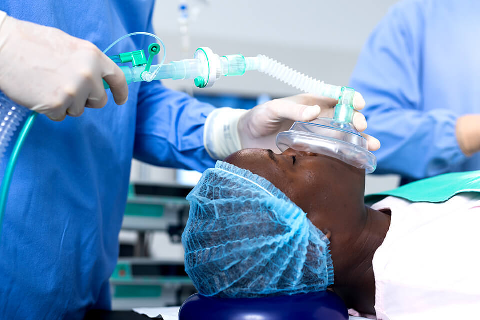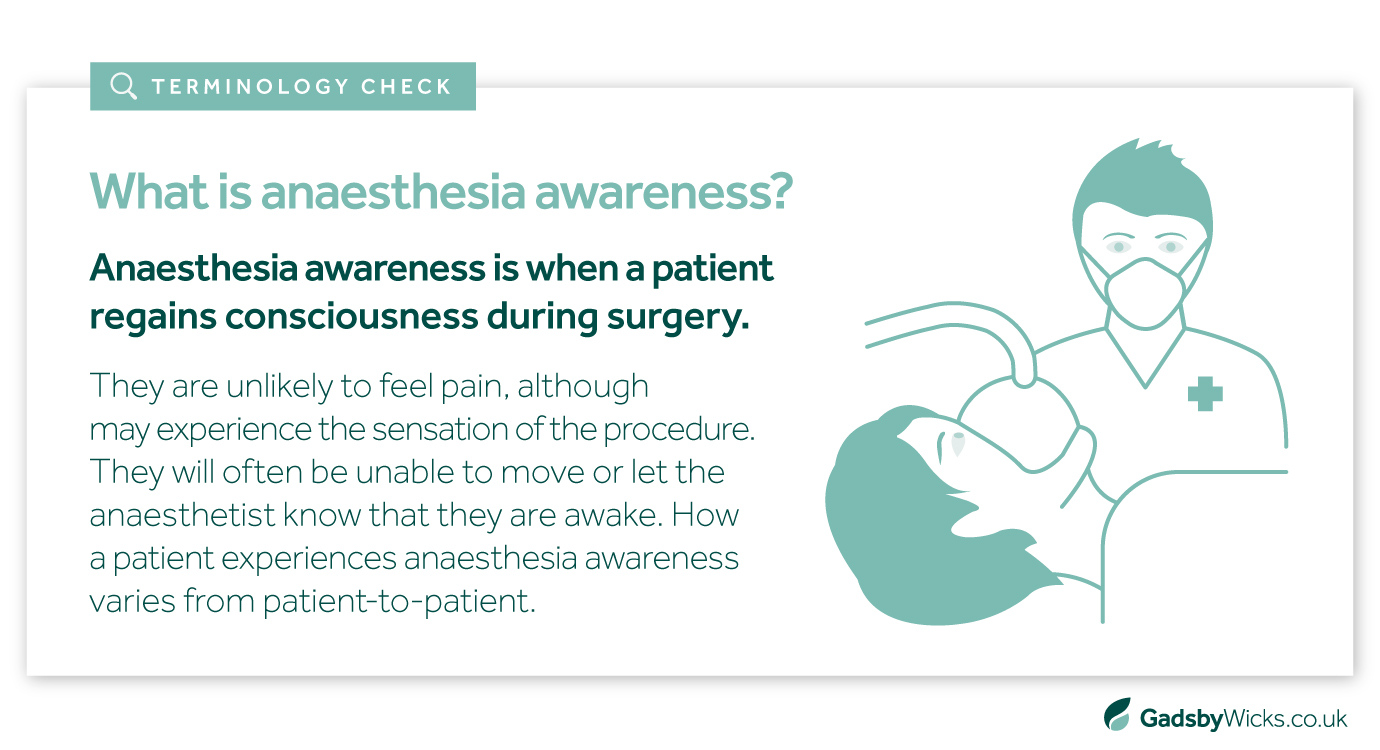- Home >
- Surgical Negligence Claims >
- Anaesthesia Awareness Claims
When mistakes are made administering anaesthesia, patients can regain consciousness mid-procedure. This is called anaesthesia awareness, and while cases are rare, this traumatic experience can cause lasting emotional and psychological damage.
If you or a member of your family woke up during surgery, you deserve an explanation and compensation for your trauma. With over 30 years of experience in medical negligence, our solicitors will approach your case with care, empathy, and a commitment to achieving justice.

Do you have an anaesthesia awareness claim?
While most surgeries happen without issue, the complexities of applying general anaesthetic mean hundreds wake up on operating tables each year. Being conscious not only causes high levels of pain, but can leave lasting psychological damage.
Whether due to incorrect doses or faulty equipment, no patient deserves this experience. We are here to investigate your case, find answers, and build a case that secures the compensation and closure you need to move on.

The specialist anaesthesia awareness claims solicitors for Essex & East Anglia
Pursuing a claim after enduring intraoperative awareness can be daunting. We appreciate the complex emotions of these cases and work tirelessly to make the process as smooth and supportive as possible.
Since 1993, we have helped people affected by anaesthetic negligence secure millions in compensation. Working on a strict ‘no win, no fee’ basis, we draw from decades of specialist experience to achieve the best outcome. With 96% of cases settled out of court, we give you peace of mind every step of the way.
What does our anaesthesia awareness claim process look like?

A free initial consultation
Call us, request a callback or complete our online form and we’ll assess if you have a valid medical negligence claim.

Funding your claim
Discover the ways we can fund your claim without you paying a penny at any stage of the process.

Investigating evidence
We gather medical records, witness statements and more to learn what happened to you and prove your claim.

Instructing independent medical experts
We work with impartial, experienced medical experts to establish whether your injuries were due to substandard medical care.

Valuing your claim
We assess your health and financial losses to accurately estimate how much compensation your claim is worth.

Presenting your case
We contact the Defendants and the Courts on your behalf to set out your allegations and receive a response.

Negotiating a settlement
We work to achieve a fair settlement for you outside the courtroom – this is how 96% of our cases end.

Preparing for Trial
If we must proceed to Trial, we fully prepare you for what to expect so you receive the right result in court.
FAQs about anaesthesia awareness claims
What is anaesthesia awareness?
Anaesthesia awareness is when an individual regains consciousness during a surgical procedure. While very few patients undergo this kind of experience, intraoperative awareness does happen to as many as 5 out of every 10,000 people.
For some, it is a fleeting occurrence they forget by the time they regain consciousness. For others, it can render them immobile and fully cognisant of the pain or sensation of their surgery, causing lasting psychological scars.
If you or someone you love has suffered from anaesthesia awareness, you may be entitled to claim compensation. Contact our team to start your claim today.

How can anaesthesia awareness occur?
There are numerous reasons why a patient might regain awareness during surgery.
If a patient is living with a severe injury or illness, a lower dose of anaesthesia may be used, which could increase the likelihood they wake up partway through their medical care. Alternatively, when completing a caesarean section, an anaesthetist may limit the amount they administer to support both mother and baby.
Similarly, if a person is more resistant to anaesthesia, it might not have the same effect on them as it would on another person. Research has shown that:
- Women are more resistant to general anaesthetic than men
- Obese people will resist anaesthetic more frequently
- Those taking certain medications before surgery may have developed greater resistance to general anaesthetics
An anaesthetist or surgeon should conduct a thorough interview with a patient before surgery to establish any factors that could increase the chances a patient will wake up during surgery. If this step is missed, it could mean incorrect levels of anaesthetic are administered, raising the risk of awareness mid-operation.
Intraoperative awareness may also occur because:
- The delivery of anaesthetic was interrupted
- Emergency drugs were used at the time
- A patient’s airway was improperly managed
To reduce the risk of anaesthesia awareness, the WHO Surgical Safety Checklist was created to outline the steps specialists should take. If a medical professional failed to follow this guidance, this could be a sign that negligence was to blame for you or your loved one’s traumatic experience.

How do I prove negligence occurred in my anaesthesia awareness case?
If you believe negligent care during surgery was responsible for your anaesthesia awareness, you should instruct an experienced medical negligence firm to investigate your case. They will look to establish three key factors:
- There was a breach of your healthcare provider’s duty of care
- You suffered pain, injury, financial loss or psychological damage
- Your suffering was directly caused by your healthcare provider’s breach of duty
Proving these elements is essential for any successful medical negligence claim. All cases are judged on the Balance of Probabilities – you must prove that it is more likely that your injuries were caused by negligent treatment than not.
As part of this process, our expert medical negligence solicitors will gather and assess all available evidence connected to your claim, including medical records and witness statements. This will help us determine whether a healthcare professional breached their duty of care, and quantify the value of compensation.
To learn more about how we pursue and prove clinical negligence claims, read our dedicated claims process page.
View our National and Essex Medical Negligence Statistics post for more industry insight.
Can I claim compensation for the psychological impact of anaesthesia awareness?
Yes. If you or a member of your family experienced negligent medical treatment, and this resulted in intraoperative awareness, it is possible to claim compensation for emotional distress.
Seeing or feeling your own operation can cause a great deal of fear, panic and stress. If you’re unable to move your body or get anyone’s attention when waking up, this can further add to the distress involved.
In these unfortunate incidents, those affected may require counselling and psychological therapy. With nightmares, panic attacks and post-traumatic stress disorders (PTSD) common following anaesthesia awareness, the compensation recovered from a successful claim can be crucial in supporting an individual’s recovery.
How much compensation can I claim for anaesthesia negligence?
Every medical negligence case is unique. That means the value of your or your family member’s settlement will depend on the individual circumstances of their claim.
As specialist solicitors with decades of experience, we take the time to fully recognise how your experience has affected you or your loved one’s life, and ensure the compensation amount issued reflects these specific details.
How long do I have to file a medical negligence claim for anaesthesia awareness?
You have three years from the date you or your loved one experienced their incident to start an anaesthetic awareness claim. However, there are exceptions to this rule:
- If a claimant is under 18, they have until their 21st birthday to start their claim
- If a claimant is considered mentally incapacitated, there is no time limit to start their claim
- If a claimant sadly passes away before the claim is resolved, the three-year time limit restarts from the date of their passing
If your injury occurred over three years ago, we still encourage you to contact our solicitors. Each claim is at the court’s discretion, and we can advise if your claim is likely to be allowed.
Furthermore, we recommend contacting us as early as possible. This ensures that evidence stays fresh and statements are more certain, reinforcing the strength of your case.
Contact our expert anaesthesia awareness claims solicitors
If you or someone you love has been affected by anaesthesia awareness, speak to someone about your options. Our team is here to listen and advise you on your next steps.

Lexcel accredited medical negligence claims solicitors
We are proud to be a Lexcel-accredited practice. The accreditation is a mark of quality and comes directly from the Law Society.
A recent assessment described us as a “Centre of Excellence” and we continue to operate to the highest standards across all main areas of our field. These include client care, case management, financial management, structure and strategy, people management, risk management, information management and file management.







